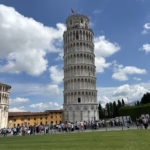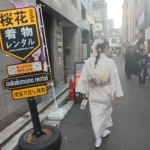Rome isn’t just another capital—it’s a place where history breathes through the streets. For anyone looking to absorb it all in one day, the perfect one-day walking itinerary in Rome does exist. We did it, without a single taxi—until the very end—and added a surprise Castel Sant’Angelo visit on the way to Vatican.
This is the best self-guided Rome day trip for travelers who want to experience Rome’s treasures on foot.
🏛️ 8:30 AM – The Colosseum: Ancient Power & Stone
- 📍Location: Colosseo Metro stop
- 🥾 Walking: From Termini or nearby hotels (~1.5 km)
- 🚗 Uber (skipped): ~€15–€20
- 🎟️Ticket: Colosseum & Roman Forum (The Underground Tickets for the Colosseum are very hard to get in the touristic season)
Your walking route from Colosseum to Vatican begins at the heart of ancient Roman power—the Colosseum. Towering over the surrounding ruins, this colossal amphitheater is one of the most iconic landmarks in the world and a powerful symbol of the Roman Empire’s might. It once hosted over 50,000 spectators, cheering on gladiatorial combat, wild animal hunts, and even staged naval battles.
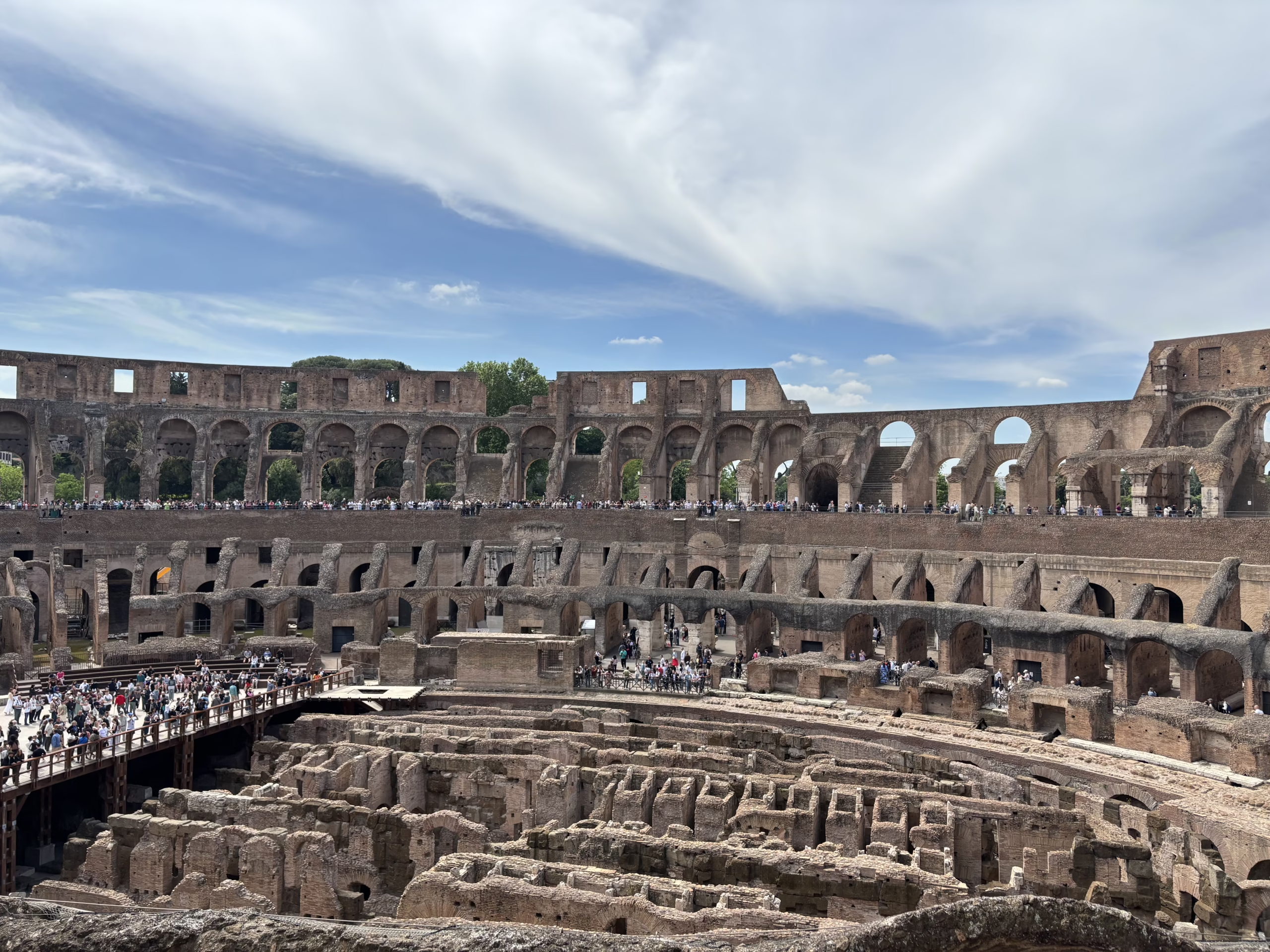
We arrived just after 8:30 AM, when the sun was still low and golden light poured through the arches. This early timing gave us two major advantages: we beat the crowds and captured stunning, soft-lit photos without dozens of tourists in the background. The silence of the morning made the moment feel more personal—almost sacred. It’s hard not to imagine the roar of the crowd echoing through time as you walk the perimeter and then venture inside.
Booking a skip-the-line ticket in advance is essential here. We spent our time walking through the underground chambers, seeing where the gladiators and animals were kept before emerging into the arena. The upper levels offer panoramic views that stretch across the Roman Forum and beyond—a breathtaking preview of what your perfect one-day walking itinerary in Rome still has in store.
This first stop set the tone for the rest of our day: immersive, awe-inspiring, and deeply connected to the rhythm of the city’s past.
Pre-booked skip-the-line tickets are a must for a stress-free visit.
🏛️ 9:00 AM – Roman Forum & Palatine Hill
- 🥾 Walking: Direct exit from the Colosseum
- 🚗 Uber: Not applicable
- 🎟️ Tickets: Roman Forum
We wandered through marble columns, crumbling temples, and moss-covered ruins that whisper the stories of an empire. The Roman Forum, once the center of political life in ancient Rome, unfolded before us like an open-air museum of fallen glory. Every path seemed to hold echoes of footsteps from senators, soldiers, and citizens who once debated, traded, and worshipped right where we stood.
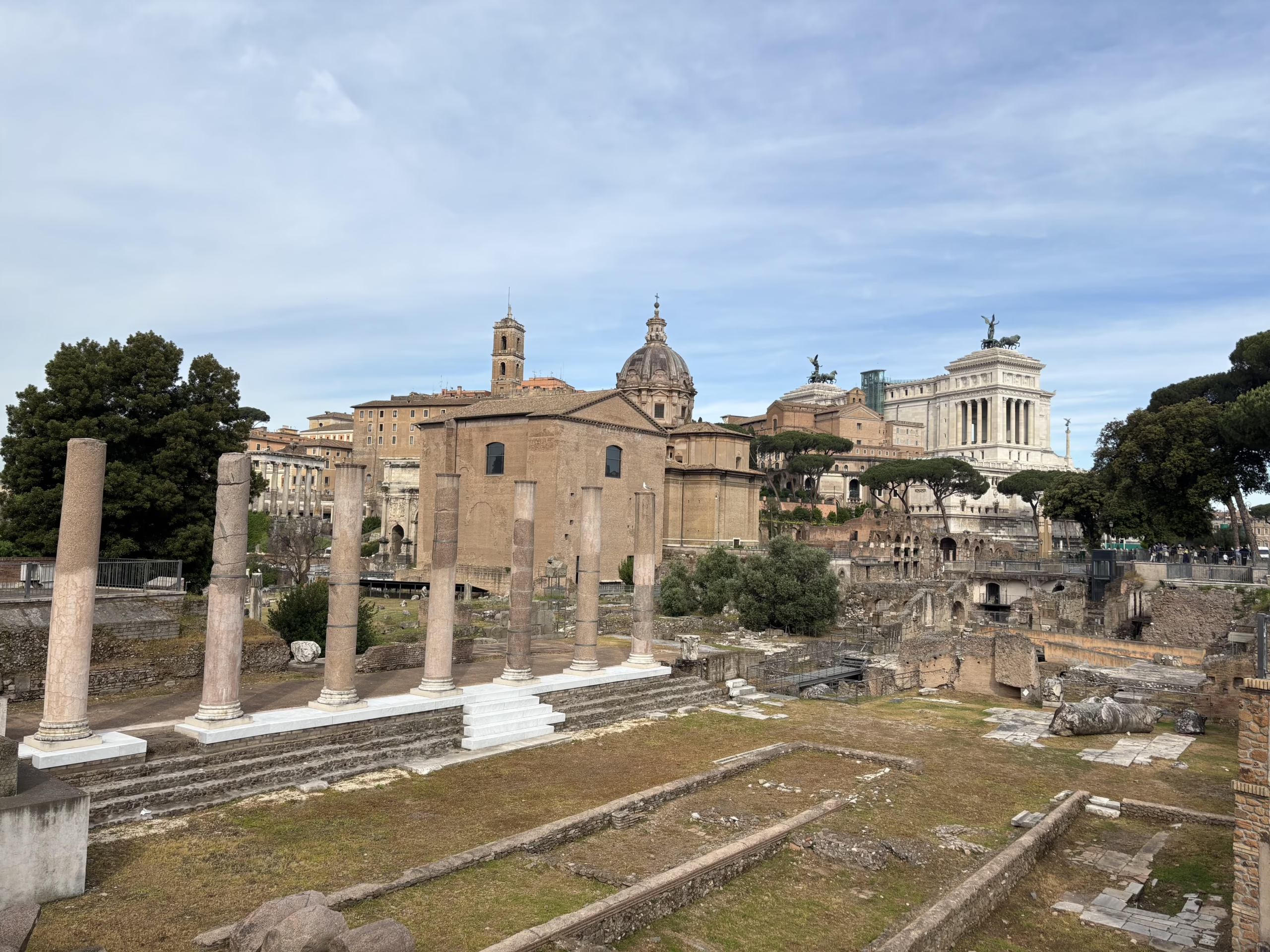
It’s not hard to picture toga-clad senators discussing laws or emperors parading in triumph after victorious battles. Structures like the Temple of Saturn, the Arch of Septimius Severus, and the House of the Vestal Virgins are worn by time, but their scale and symbolism still inspire awe. We paused frequently, not only to read plaques but to simply absorb the atmosphere—a kind of reverence that only places with this much historical weight can evoke.
Then we made our way up to Palatine Hill, one of the seven legendary hills of Rome and, according to myth, the birthplace of Romulus, Rome’s founder. The climb is gentle and surrounded by pine trees and ancient brickwork. At the top, we were rewarded with sweeping views: to one side, the green expanse of the Circus Maximus; to the other, a bird’s-eye look over the entire Forum, rooftops glowing under the Roman sun.
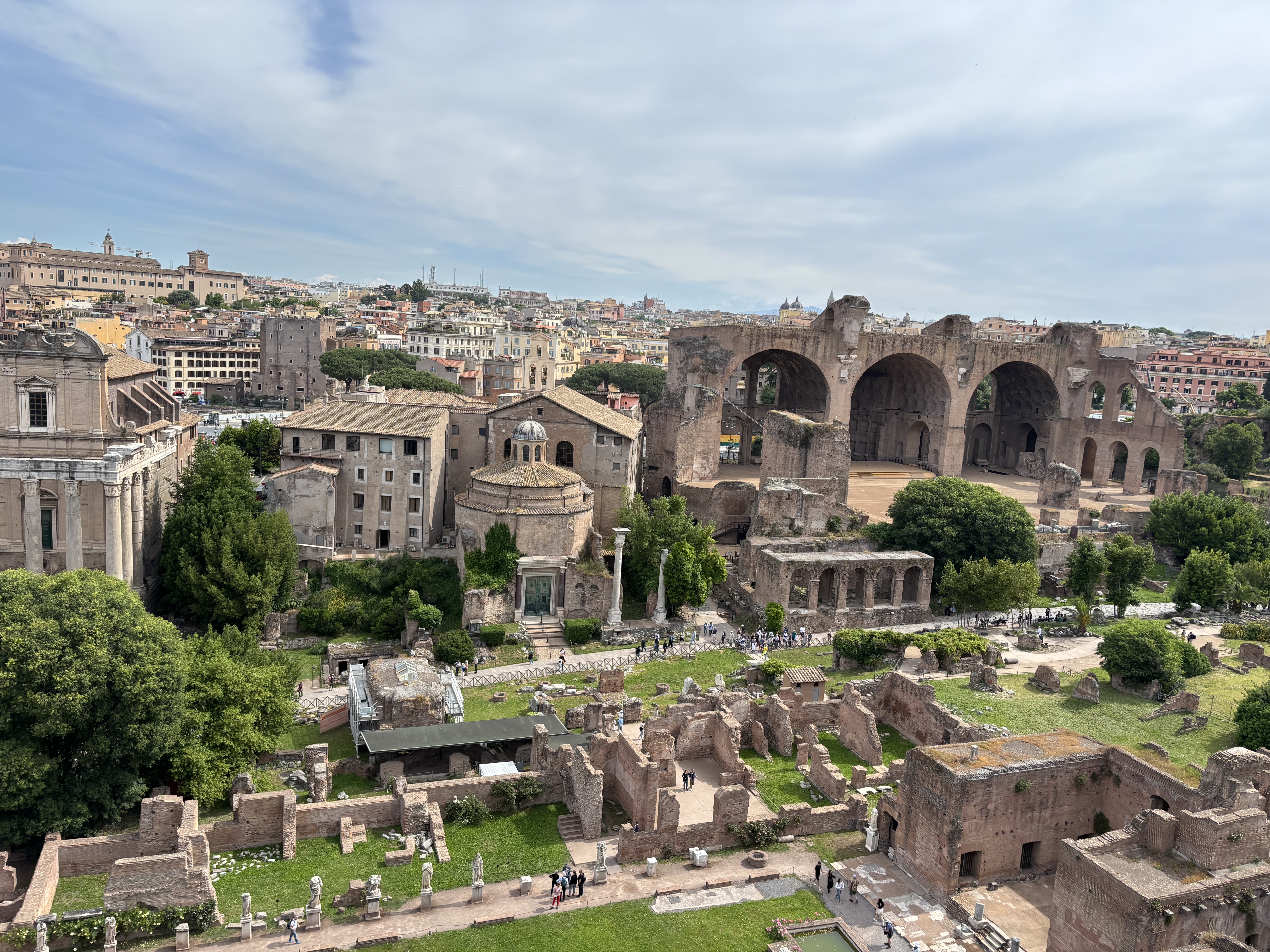
Deep within the Roman Forum lies the modest grave of Julius Caesar, one of history’s most legendary figures. Marked by a simple stone altar beneath the ruins of the Temple of Caesar, it draws quiet respect from visitors every day. Remarkably, more than 2,000 years after his assassination on the Ides of March, fresh flowers still appear here regularly—left by strangers moved by his legacy. It’s a powerful reminder that in Rome, even ancient history remains very much alive.
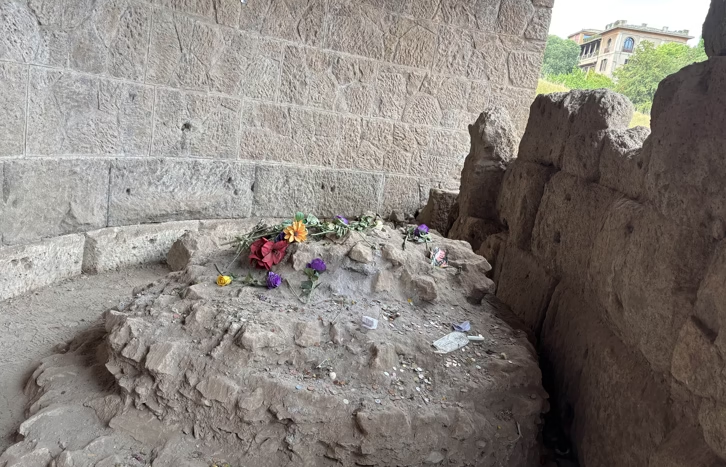
It was here that we paused to reflect. These were no longer just ruins—they were chapters of human history, layered and alive. And in that quiet moment overlooking the heart of an empire, we felt fully immersed in the spirit of our perfect one-day walking itinerary in Rome.
Walking through history like this cemented our belief that this was the perfect one-day walking itinerary in Rome.
🏛️ 11:15 AM – Piazza Venezia
- 🥾 Walking: 15 min from Palatine
- 🚗 Uber (skipped): ~€10, 5–7 min
We continued our journey along Via dei Fori Imperiali, a wide, majestic avenue flanked by the remnants of imperial forums. The walk itself felt like strolling through a timeline—columns rising on both sides, statues watching silently, and ancient stones resting underfoot. Every few steps seemed to unveil another slice of Rome’s layered history.
Soon, the imposing white marble structure of the Altare della Patria came into view, also known as the Vittoriano or the Monument to Victor Emmanuel II. Towering at the heart of Piazza Venezia, this monument honors the first king of unified Italy and is one of the most commanding sights in modern Rome. With its grand staircases, Corinthian columns, bronze quadriga statues, and the eternal flame guarded by soldiers, it feels every bit as epic as the ruins behind us—but in a completely different, more modern way.
Many visitors skip this spot, either because it’s not ancient or because it’s not included on standard tour routes. But they’re missing out. The Vittoriano is bold, unapologetically grand, and deeply symbolic for Italians. It also offers one of the most underrated photo opportunities in the city: the sweeping steps and massive colonnades provide an incredible backdrop, and for just a few euros, you can take an elevator to the top for panoramic views across Rome.
This stop marked a natural milestone in our walking route from Colosseum to Vatican—the transition from ancient to modern Rome, and a moment to pause and appreciate how history here doesn’t live in one era but spans millennia, stitched together street by street.
🍝 12:00 PM – Lunch at Ristorante il Buco Roma
- 📍Address: Via Santa Maria in Via, 32
- 🥾 Walking: ~10 min from Piazza Venezia
- 🚗 Uber (skipped): ~€10
We stopped for lunch at Ristorante il Buco Roma, tucked just a short walk from the Pantheon. It’s a cozy, authentic Roman spot serving pasta the way locals love it—al dente, flavorful, and humble.
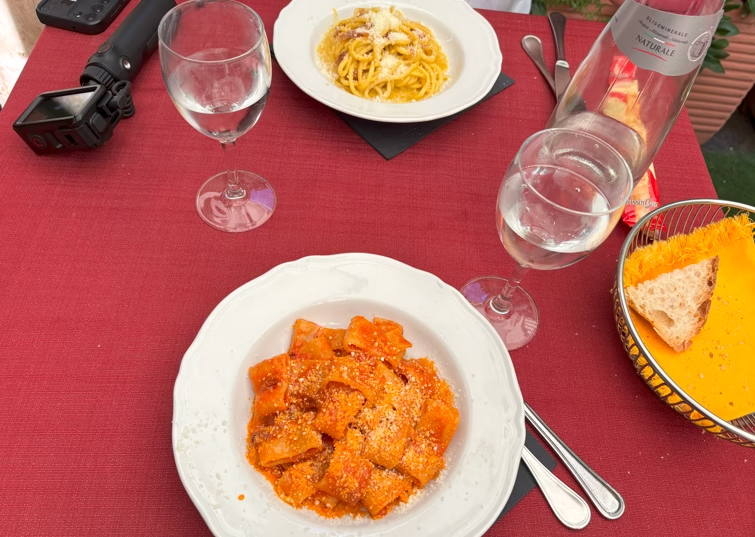
Their carbonara and amatriciana were the real deal. Sitting here, sipping house wine, we felt truly immersed in the rhythm of the city. A perfect stop in the best self-guided Rome day trip.
⛲ 1:15 PM – Pantheon, Piazza Navona & Trevi Fountain
- 🥾 Walking:
- 5 min to Pantheon
- 5–10 min to Piazza Navona
- 15 min to Trevi Fountain
- 🚗 Uber (skipped): ~€15 between spots
- 🎟️Tickets: Tickets or Pantheon is walk in (5 Euros in Cash) and the others Free (Sometimes the waiting time can be long)
After lunch, we continued our journey by foot, weaving through narrow cobblestone streets and sun-drenched piazzas, until we reached the Pantheon—a true architectural marvel and one of the most extraordinary survivors of ancient Rome. Standing before its grand portico, supported by sixteen massive Corinthian columns carved from Egyptian granite, we were struck by its sheer scale and symmetry. It’s hard to believe that this structure has been standing for nearly 2,000 years, weathering the fall of empires, wars, and revolutions.
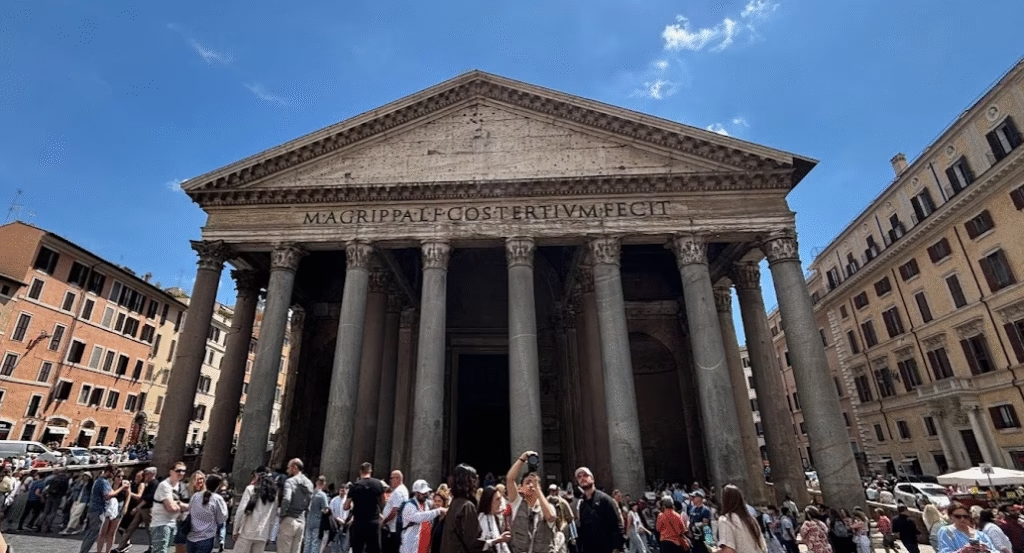
Originally built as a temple to all Roman gods, and later converted into a Catholic church, the Pantheon has served as a sacred space for countless generations. As we stepped through its heavy bronze doors into the cool, echoing interior, we felt an immediate shift in atmosphere—from the lively buzz of the streets to a solemn, almost spiritual stillness.
The oculus at the center of the dome—the building’s only source of natural light—lets sunlight pour in from above, casting a soft, glowing beam that slowly moves across the floor as the day progresses. It’s hypnotic to watch, almost like a celestial spotlight that seems to breathe life into the ancient stone. The dome itself, still the largest unreinforced concrete dome in the world, stretches overhead with impossible grace, a testament to the ingenuity of Roman engineers.
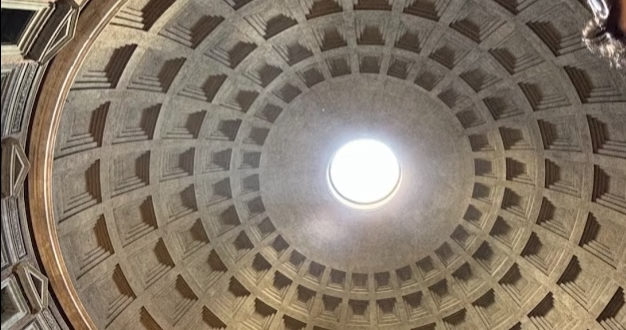
We stood in awe beneath its vast circular ceiling, letting the space surround us. Tourists whispered, children stared upward, and everyone—regardless of where they were from—seemed to share a moment of reverence. The Pantheon isn’t just a historical site; it’s an emotional experience, a reminder of what humanity is capable of when art, science, and spirit converge.
This moment, quiet and majestic, became one of the highlights of our perfect one-day walking itinerary in Rome. It reminded us that even in a city overflowing with beauty, some places still manage to take your breath away.
From there:
- Piazza Navona: Baroque fountains, artists, energy
- Trevi Fountain: A coin, a wish, a splash of eternity
No visit to Rome is complete without a stop at the iconic Trevi Fountain. As we approached, the sound of cascading water grew louder, echoing off the surrounding palazzi. The fountain bursts with sculptural energy—Neptune stands tall in his chariot, flanked by tritons taming wild seahorses. It’s a dramatic scene frozen in marble, and yet it feels alive.
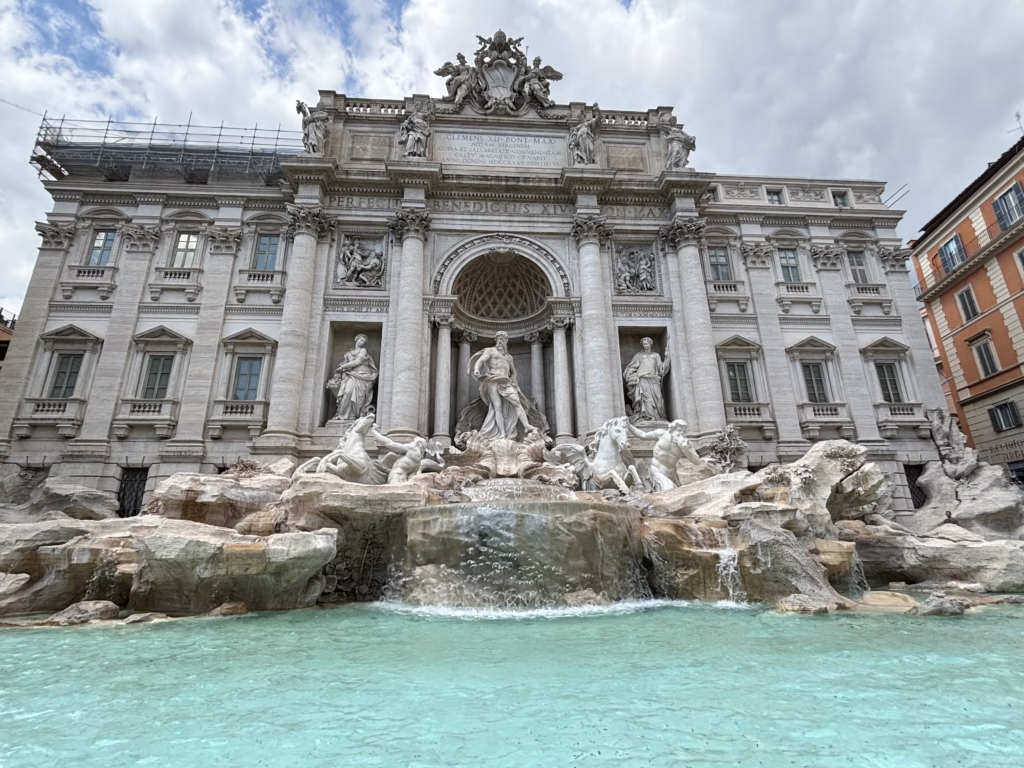
We joined the timeless ritual: tossing a coin over our left shoulder into the water, said to guarantee a return to Rome. Surrounded by people from all over the world doing the same, it felt like a shared wish whispered into the heart of the city. It was a magical moment in our perfect one-day walking itinerary in Rome—a brief pause for wonder, tradition, and a touch of superstition.
Our day continued with a visit to the famous Spanish Steps, one of Rome’s most elegant and lively gathering spots. Built in the 18th century to connect the Trinità dei Monti church above with the Piazza di Spagna below, the 135 steps are as much a social stage as they are a historic monument.
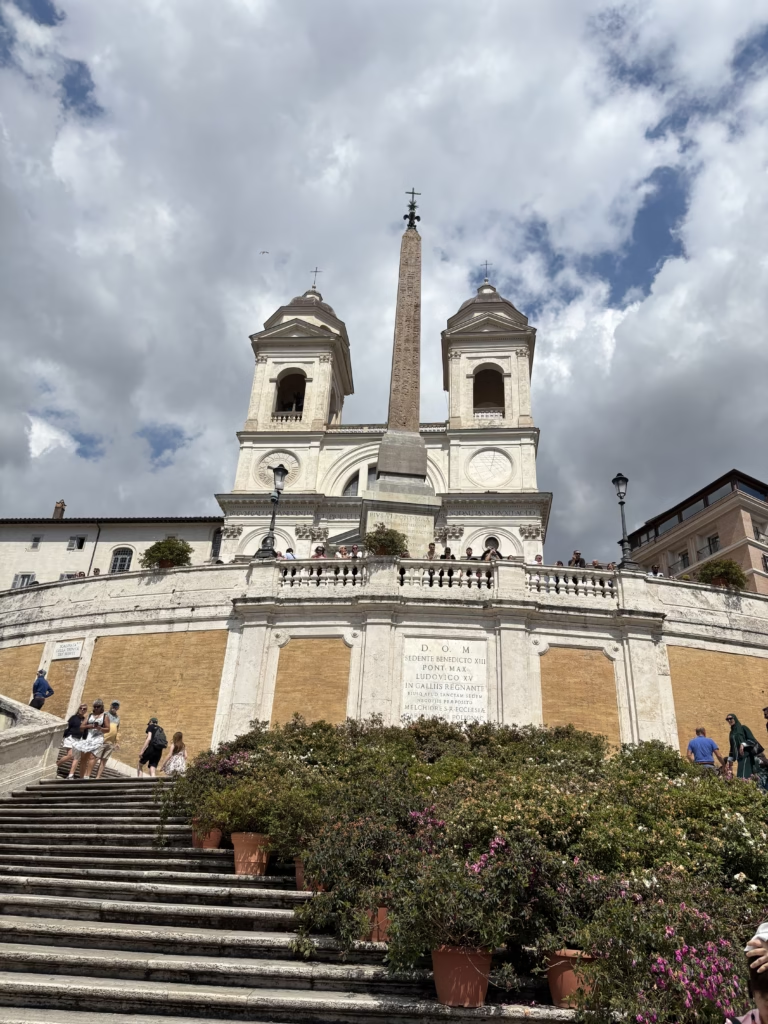
As we climbed the steps, we were surrounded by people relaxing in the sun—tourists snapping selfies, artists sketching, and locals enjoying gelato. At the top, we took in sweeping views of rooftops, domes, and buzzing Roman life below. It was the perfect moment to pause and soak in the city’s atmosphere, halfway through our perfect one-day walking itinerary in Rome.
Sitting there with an espresso in hand, the energy of the city felt both grand and intimate. It’s no wonder these steps have been inspiring painters, poets, and travelers for centuries.
We didn’t rush—one of the perks of this Rome itinerary with no taxi is discovering beauty in the slow moments.
🌉 3:00 PM – Castel Sant’Angelo Visit on the Way to Vatican
- 🥾 Walking: 20 min from Trevi Fountain
- 🚗 Uber (skipped): ~€15
- 🎟️ Tickets: Tickets
Following the gentle curve of the Tiber River, we walked under the warmth of the afternoon sun, with Rome’s golden light reflecting off the rippling water beside us. It was a peaceful contrast to the bustling piazzas we’d passed earlier. Locals sat on benches with gelato, street musicians strummed acoustic guitars, and cyclists zipped by with baskets full of groceries. This stretch of our walking route from Colosseum to Vatican offered a chance to slow down and appreciate a quieter, more reflective side of the city.
As we approached the towering silhouette of Castel Sant’Angelo, its presence grew more magnetic with every step. Originally built as a mausoleum for Emperor Hadrian in the 2nd century, the structure has lived many lives: a fortress, a prison, a papal residence, and now a museum. Though it wasn’t part of our original itinerary, we found ourselves instinctively drawn toward it—as if the city itself was inviting us to take a detour.
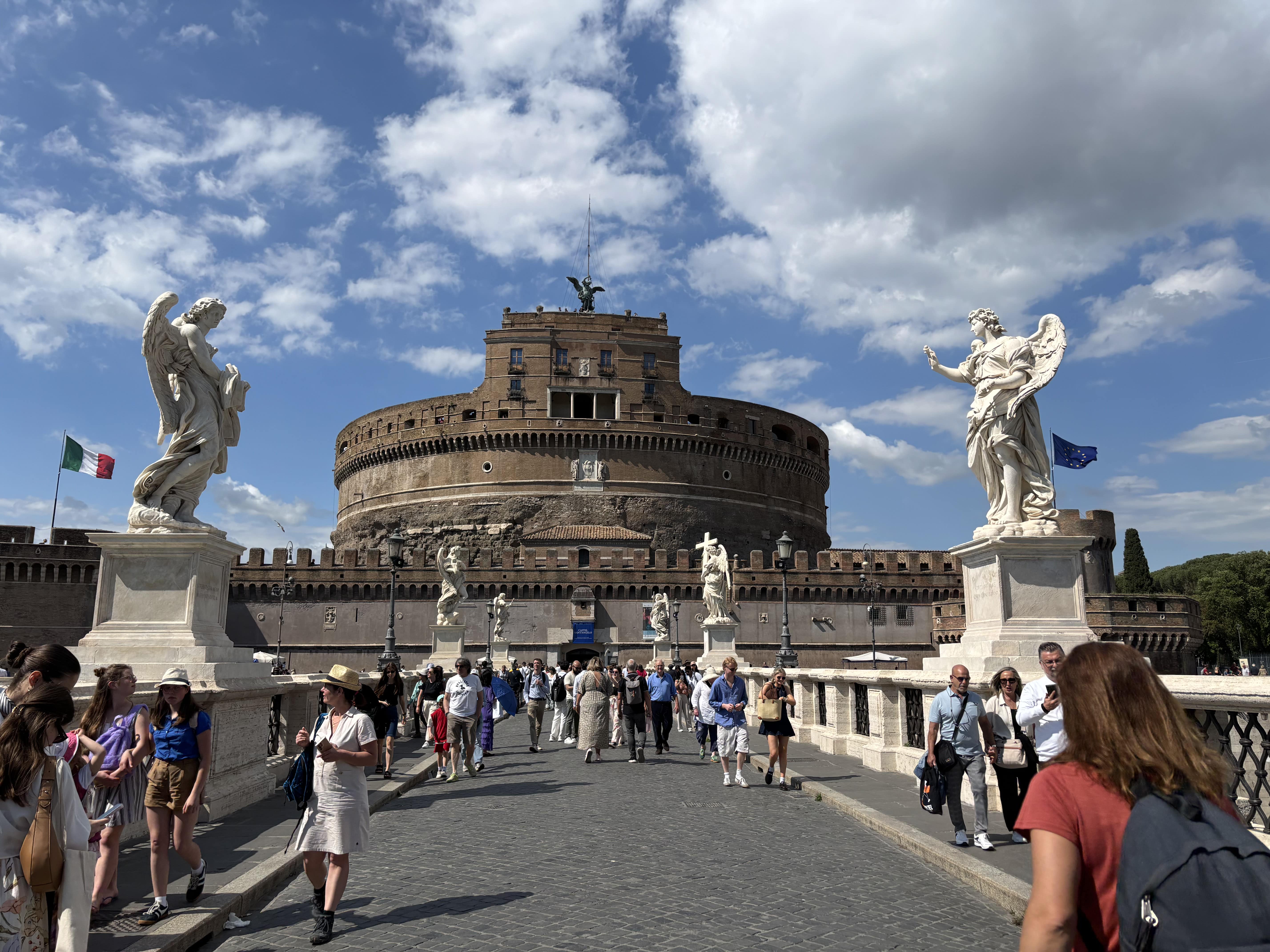
Without hesitation, we crossed the Ponte Sant’Angelo, the ornate bridge that leads directly to the castle’s gates. Lined with statues of angels designed by Bernini and his students, the bridge feels like a theatrical passageway between eras. Each angel holds a symbol of Christ’s Passion, and as we walked past them, we couldn’t help but feel that we were moving through a living gallery suspended in time.
Once inside the Castel Sant’Angelo, we climbed its spiral ramps and winding corridors, eventually emerging onto the rooftop terrace. There, Rome unfurled in every direction—St. Peter’s Basilica to one side, the river beneath us, and the historic cityscape stretching across the horizon. The view was breathtaking, offering a moment of stillness and perspective that few other landmarks in the city provide.
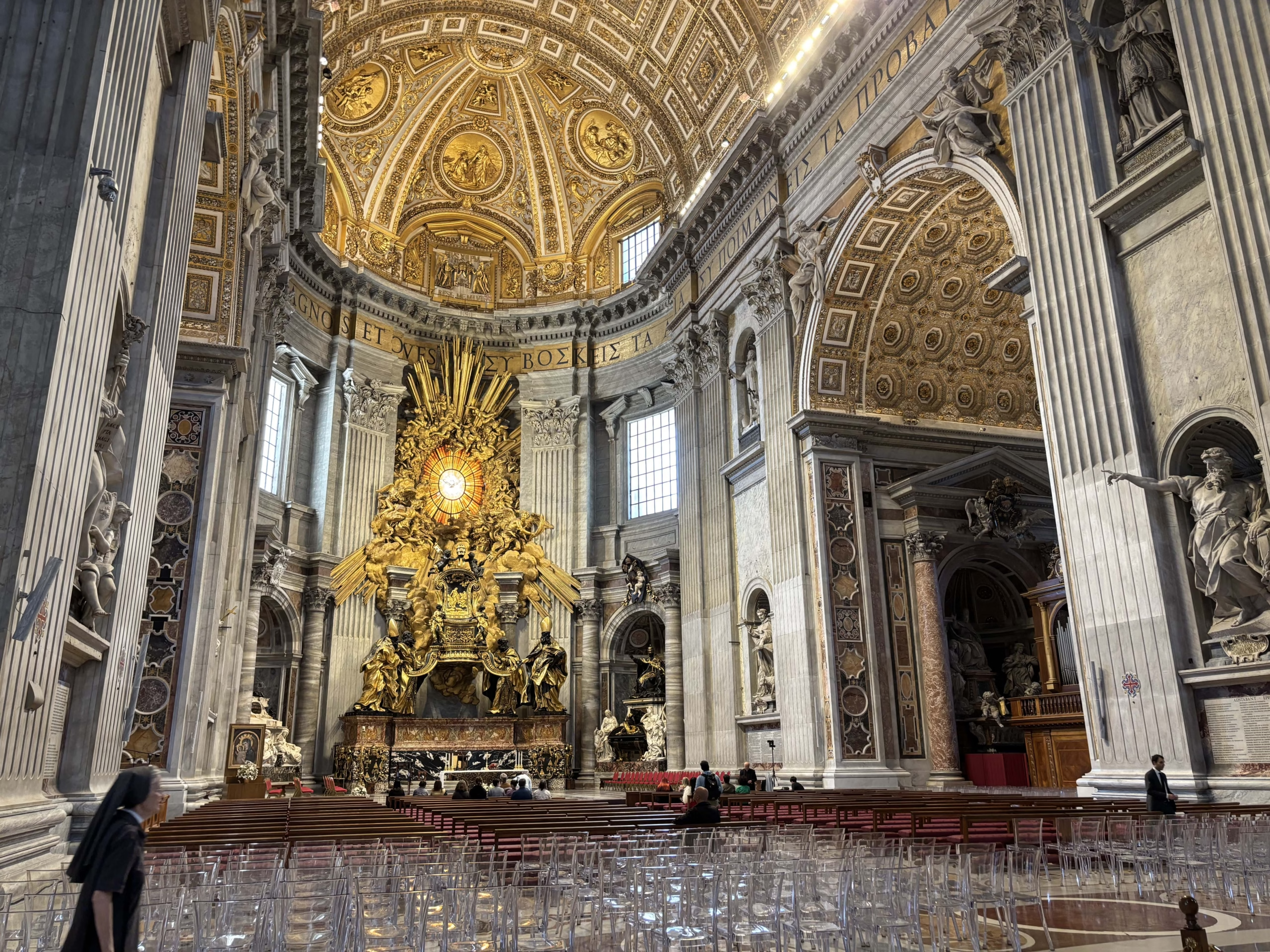
This spontaneous Castel Sant’Angelo visit on the way to Vatican turned out to be one of the most memorable parts of our day. It wasn’t just the views or the deep sense of history—it was the unexpected beauty of changing direction, of discovering something powerful simply by being open to it. That’s the real magic of Rome.
And we’re so glad we did. With sweeping views over the city and the Vatican dome in the background, it became one of the most iconic photos of the trip. That unplanned Castel Sant’Angelo visit on the way to Vatican proved that flexibility in travel often leads to the most unforgettable moments.
Walking made this kind of spontaneous magic possible. Yet another reason why this is, without a doubt, the best self-guided Rome day trip.
🍦 4:00 PM – Break Near Vatican: Gelato or Coffee
- 🥾 Walking: 10 min from Castel Sant’Angelo
- 🚗 Uber (skipped): unnecessary
Before entering the museums, we needed a recharge. A gelato from a nearby spot on Via dei Gracchi and an espresso from Via Cola di Rienzo gave us the boost to take on the Vatican Museums.
This recharge keeps your perfect one-day walking itinerary in Rome smooth and sustainable.
🎨 5:30 PM – Vatican Museums & Sistine Chapel
- 🥾 Walking: 5 min from coffee stop
- 🚗 Uber: Not necessary
- 🎟️Tickets: Vatican Museum
It was time for the cultural climax of our walking route from Colosseum to Vatican, the final chapter in a day that had already felt like walking through an open-air museum. After crossing the Tiber and pausing at Castel Sant’Angelo, we arrived at the Vatican just in time for our 5:30 PM slot at the Vatican Museums.
Booking in advance is essential—especially in the late afternoon, when the tour groups start to thin out and the atmosphere becomes noticeably calmer. With our digital tickets ready, we stepped through the grand entrance into one of the most treasure-filled complexes on Earth.
Inside, it felt like entering a different universe—one where every ceiling, wall, and hallway is a celebration of human creativity. The route winds through gallery after gallery: ancient Egyptian sarcophagi, Roman busts, Renaissance tapestries, maps that once defined empires, and entire rooms painted by Raphael himself.
We moved slowly, in awe. The Gallery of Maps, with its long vaulted ceiling and oversized frescoed cartography, felt like an ancient Google Earth. The Gallery of Tapestries stunned us with vibrant color and detail, each piece telling sacred stories in thread. And in between, marble floors, arched doorways, and soft light filtering through stone-framed windows created a quiet, reverent tone.
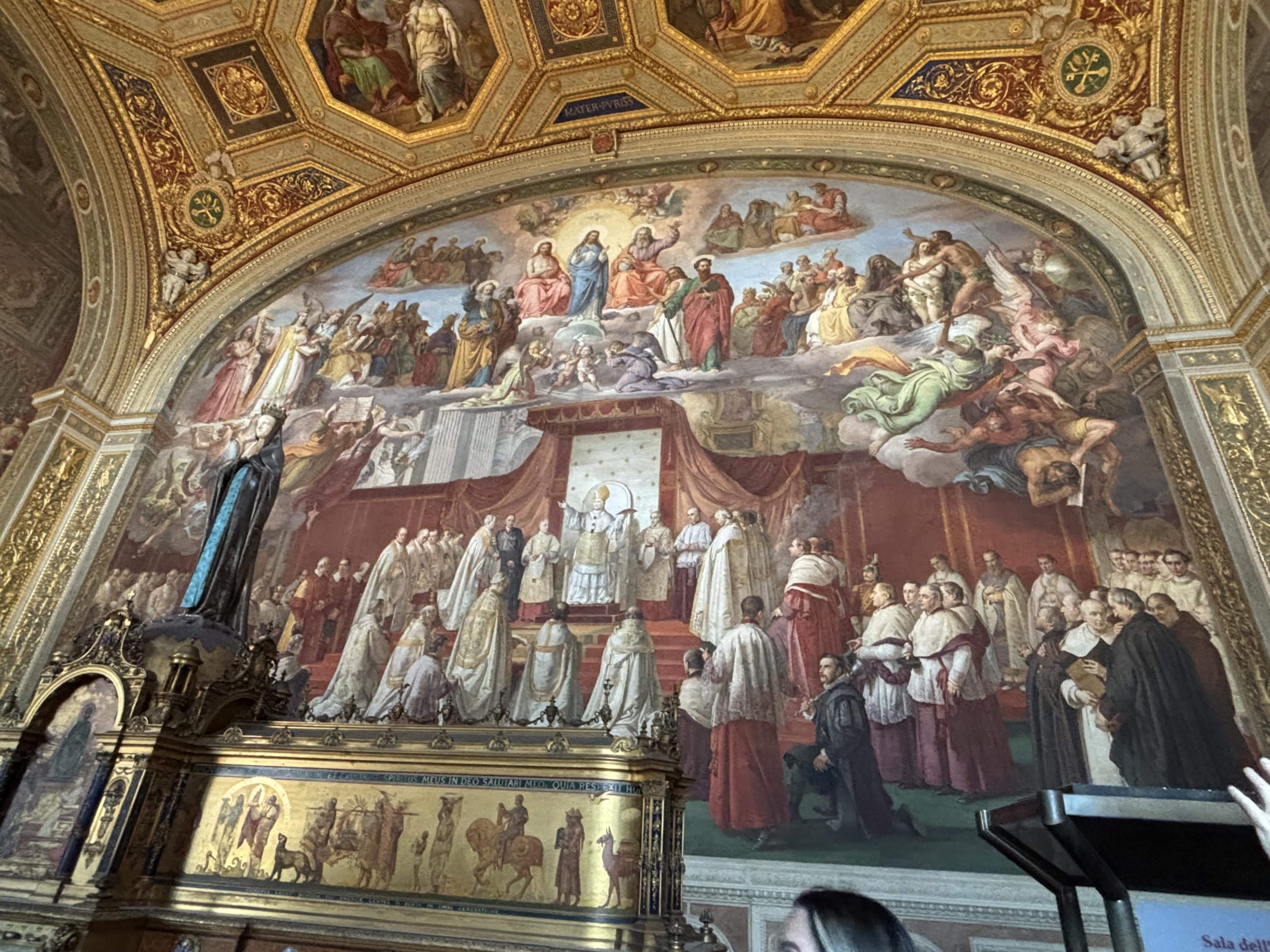
Every room invited us deeper—not just into art history, but into the evolution of Western thought, faith, and imagination. It was more than a museum. It was a cathedral of human achievement.
But there was one twist we hadn’t expected.
As we reached the final corridors leading to the legendary Sistine Chapel, a quiet announcement echoed through the speakers: “Due to the ongoing papal transition, the Sistine Chapel is currently closed to the public.”
The timing of our visit coincided with the rare and sacred process of selecting a new pope. The Conclave was underway—a once-in-a-generation event where cardinals from around the world gather under Michelangelo’s ceiling to choose the next leader of the Catholic Church. The doors of the chapel were sealed, and the world was watching for the next puff of white smoke.
At first, we were disappointed. After all, seeing the Sistine Chapel was supposed to be the highlight of this part of our day. But that feeling quickly turned into something else—reverence. It felt like we were brushing up against living history. Few visitors get to be this close while the gears of an ancient institution turn in real-time.
Instead of seeing The Creation of Adam in person, we stood just outside, imagining the chapel’s grandeur, and knowing it was currently playing host to the very ceremony that has shaped the Catholic Church for centuries. It gave our perfect one-day walking itinerary in Rome a once-in-a-lifetime twist—less about what we saw, and more about what we felt.
As we left the museums, the golden dome of St. Peter’s Basilica gleamed in the twilight. The streets were quiet, the crowds dispersed, and we were filled not with disappointment, but a strange sense of privilege. We hadn’t just seen art—we had walked into the pages of history.
- Raphael’s Rooms
- Hall of Maps
- Sistine Chapel – Closed 😭 (New pope was elected)
We spent nearly 2 hours soaking it all in. The crowds thin out toward evening, making this time slot ideal for anyone attempting the best self-guided Rome day trip.
🍷 7:30 PM – Taxi Ride + Dinner at Trattoria Cecio
- 🥾 Walking: Optional
- 🚗 Uber: ~15–20 min, €15–€20 (our only ride of the day)
By now, we were ready to sit. For dinner, we took our one and only taxi from the Vatican to Termini—around 20 minutes—and landed at Trattoria Cecio, a charming trattoria near our hotel.
It was the perfect wind-down. Dim lighting, checkered tablecloths, and local Romans chatting around us. The cacio e pepe was simple and elegant. After a full day of walking and discovery, this cozy spot brought everything together.
Yes, we broke the “Rome itinerary with no taxi” rule once—but only after 20,000+ steps and a heart full of memories.
🧭 Why We Walked (Almost) the Whole Way
This wasn’t just a time-saving trick. Our Rome itinerary with no taxi allowed us to:
- Save over €100 in Uber rides
- Burn enough calories to enjoy full bowls of pasta guilt-free
- See the streets of Rome
From the Colosseum to the Vatican, with surprises like a Castel Sant’Angelo visit on the way to Vatican, we saw it all. Step by step.
🧩 Final Thoughts
This was, without a doubt, the perfect one-day walking itinerary in Rome. Every step felt purposeful yet free. We had carefully mapped out our walking route from Colosseum to Vatican, but we also allowed ourselves to be led by instinct, by beauty, by the rhythm of the streets. It was a journey measured not in kilometers, but in impressions, emotions, and unforgettable moments.
We weren’t just checking off a list of landmarks or shuffling between locations in the back of a taxi. We were explorers moving through time, walking in the very footsteps of emperors, artists, popes, and poets. At each corner, Rome offered us something unexpected—a quiet piazza bathed in golden light, the sound of a violin echoing through an alley, the smell of fresh bread from a hidden bakery. These are the kinds of gifts you miss when you rush.
And that Castel Sant’Angelo visit on the way to Vatican? It wasn’t in our plan, but it became the soul of the day. The view from its rooftop, the hush of its ancient walls, the statues watching silently as we crossed the angelic bridge—it added a layer of emotional depth that no guidebook or app could’ve suggested. It reminded us that sometimes, the best parts of travel are the ones you didn’t expect.
So if you’re planning your own Roman adventure, make it a Rome itinerary with no taxi. Trust your legs, your eyes, your sense of wonder. The Eternal City rewards those who take the time to walk her paths. This isn’t just about saving money or skipping traffic—it’s about experiencing Rome the way it was meant to be experienced: slowly, soulfully, and fully awake.
The best self-guided Rome day trip doesn’t require wheels, reservations, or rigid itineraries. Just comfortable shoes, a curious heart, and maybe a gelato or two along the way. Let the city carry you. She always does.
Next stop for us is Tuscany.
Stay ahead of the game with exclusive travel tips, insider guides, and behind-the-scenes stories—subscribe now and never miss an adventure! 🚀✈️


